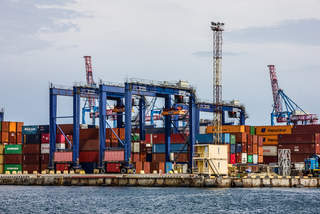
© Fotolia/Vlada Z
Export Controls: Balancing Economic Policy and Security Concerns
Export control policy regulates the export of certain commodities or information for reasons of national security or protections of trade. This policy field also encompasses sanctions of foreign actors and countries for foreign policy reasons. They thus take precedence over economic considerations. At the same time, the challenge lies with constantly weighing security objectives against their economic damage – and in finding a balance, considering that national security cannot always be served through economic restrictions.
Effectiveness of Export Controls Requires International Cooperation
For this reason, Germany is actively involved in the international export control regimes. Four regimes are charged with developing common policy and drawing up lists of controlled goods, which member states then execute through national legislation: the Nuclear Suppliers Group for the non-proliferation of nuclear weapons; the Australian Group for protection from biological and chemical warfare agents; the Missile Technology Control Regime for the control of ballistic missiles; and the Wassenaar Agreement, whose members aim to provide stability through restricting access to conventional arms and dual-use goods.
For these control regimes to work effectively, while ensuring a level-playing-field internationally, it is of great importance that countries act in unison. Time and again, however, individual states break the ranks of such joint efforts and employ their national export controls in the pursuit of protectionist commercial policies.
The export of goods listed on one of the above-mentioned control lists requires a license. These are granted by the Federal Office of Economics and Export Control (BAFA). In 2018, about 6,300 mostly medium-sized companies submitted almost 48,000 applications and inquiries to BAFA. According to the agency, positively approved applications amounted to a total volume of about 22.3 billion euros. Many of the goods are dual-use items, i.e. goods that can be used for both civilian and military applications. Against this background, the reform to the European Dual-Use Regulation is of particular importance for German industry.
Sanctions: Important Foreign Policy Tool
According to Article 41, Chapter VII of the Charter of the United Nations (UN), the UN Security Council upon determining the existence of any threat to the peace, breach of the peace, or act of aggression can adopt economic sanctions up to the complete or partial interruption of economic relations. Short of such a boycott, measures have in recent times more often consisted of the systematic targeting and freezing of private assets abroad.
In addition to sanctions mandated by the UN Security Council, states can also apply plurilateral and unilateral sanctions. For example, following the Russian annexation of Crimea and the subsequent invasion of eastern Ukraine, the transatlantic partners agreed to impose joint measures. In the UN Security Council, of which Russia is one of the five permanent members with veto powers, leveraging Chapter VII would have been out of the question.
Unilateral sanctions are problematic and seldom effective. The withdrawal of the United States from the nuclear agreement with Iran is such a case of unilateral sanctioning. The Joint Comprehensive Plan of Action (JCPoA) had been adopted by the permanent members of the UN Security Council and Iran in Resolution 2231/2015. By reintroducing its sanctions against Iran, the United States is now forcing companies to choose between their U.S. business and maintaining relationships with businesses in Iran. Thus, the United States applies U.S. law on non-American economic operators outside its own territory. What is more, Washington leverages the dominant position of the U.S. dollar as the international anchor currency and its position as the world’s deepest and most liquid financial market to exert pressure on economic operators. Small and medium-sized companies are hit particularly hard as access to credit becomes increasingly difficult.
However, the extraterritoriality of sanctions or export controls is not just a U.S. phenomenon. German industry is concerned that this practice is setting an international example. An example of this is the Chinese draft law on export controls for dual-use goods.
Export controls policies and sanctions are only effective if businesses can handle them responsibly. They need to be transparent and balanced, with clear legal concepts, procedures, and responsibilities. In a globalized world, they need to be coordinated internationally. Otherwise, they can easily be circumvented through third countries and lead to unlevel-playing-fields.



